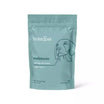It's hard to leave our dogs when we go to work or on a trip. And it's hard for our dogs too! They hate when we leave and can become lonely, bored, and even anxious. You probably watch your dog barking on a doggy cam, making you wonder, "Is there a reason my dog barks when I leave?"
Yes! There are a lot of reasons dogs bark in general, including when we leave the house and they're left home alone. If you don't want your dog to bark every time you're away (and get complaints from the neighbor because your dog barks excessively), the first thing to do is pinpoint why your dog is barking and what's triggering them. Then, you can find natural ways, maybe even seeking help from a certified applied animal behaviorist, to stop your pup's ferocious dog bark when left alone.
Why Do Dogs Bark?
Dog barking is one of the louder ways pups communicate with each other and with us. To better express themselves to humans, dogs will use a variety of different barks. It can be a good thing when they alarm us of an intruder or some kind of danger but it can become excessive and need correction. A dog barking when they're hungry sounds different from their dog bark when they feel threatened by an approaching dog or are battling some separation anxiety. Here are some common types of barking you should learn to identify to better understand your dog.
Territorial Barking
A lot of dogs are territorial by nature. You can tell this is the case if your dog's behavior changes when a person or animal approaches their territory, which is usually your home or yard. A dog's territory might even include your car or the sidewalk in your neighborhood, as well as other places your dog frequents.
Alarm Barking
Alarm barks are in response to a noise or sight that triggers your dog. This is a bark that is meant to warn you something is off, whether it's strange weather or a stranger coming to the front door. But unlike territorial barking, alarm barking can be done outside of a familiar location and isn't just about defending a familiar spot.
Greeting Bark
Unlike an alarm bark's aggressive sound and stiff body language, a greeting bark is often more relaxed. You'll often see your dog's tail wagging and hear your dog whine as well. Greeting barks are in response to people or animals that your dog is excited to see.

Attention-Seeking Bark
Dogs will quickly learn that barking several times (or being loud in general) will get your attention. They'll often bark to get your attention, food, toys, pets, or playtime.
Frustrated Barking
Dogs will often bark when frustrated, much like a child yelling or wailing. Your dog might start barking when they are tied up but want to be where you are or see another dog they want to play with that's outside or far away.
Bored Barking
Keep in mind that sometimes when dogs get bored, they'll start barking. Dogs need stimulation, whether it's social interactions, playtime, training, dog exercise, or mental stimulation. When they are cooped up or bored and home alone, your dog might start to make some noise, whether it's to get your attention or amuse themselves, or just out of frustration.
Compulsive Barking
Compulsive barking is repetitive, often with your dog repeatedly barking while also doing other repetitive behaviors like running back and forth or pacing. This might be a nervous or anxious behavior.
Social Barking
Some dogs will often start barking as an automatic response to other dogs barking. When your dog even hears a dog from the neighborhood barking in the distance, they might feel obligated to join in. This is one of many reasons it's recommended dog owners socialize their pups at an early age.
What Does It Mean If My Dog Barks When I Leave?
Dogs are social creatures. They love to hang out with us, even if we are reading in bed or doing laundry. And they like to be brought with us to the park, on errands, and even on trips. So it's no surprise that dogs get upset when we leave.
Some dogs will react to us leaving by barking. But what does this mean?
Barking is often a behavior associated with separation anxiety. This is when a dog feels anxious and upset about being away from you. It goes beyond just being sad you're gone and leads to many destructive and anxious behaviors.
According to the ASPCA, here are some common symptoms of a dog with separation anxiety:
- Urinating or defecating
- Destructive behavior, like chewing and scratching
- Excessive barking and howling
- Trying to escape
Here are some reasons that dogs excessively bark when you're gone:
Change of Family
Dogs get extremely attached to their owners. So when they are surrendered to a shelter or given to a new family, dogs can develop separation anxiety. They get scared that you may be gone forever when you leave.

Fear of Being Alone
Many dogs, especially young puppies, get scared when you leave them home alone. This is similar to separation anxiety, except that instead of barking because they want their owner to come back, they bark because they are afraid of being left alone. The excessive barking in this scenario comes from fear rather than desire. You can address the problem by making the home safe and comfortable for your anxious dog.
Change in Their Schedule
Dogs can adjust to patterns and schedules, sort of like us. When that schedule changes, dogs can get a bit anxious. If you leave for longer than usual or go on vacation, your dog may start to feel stressed about the sudden change.
Loss Of a Loved One
If a family member, two-legged or four-legged, passes away or leaves, dogs can sometimes develop separation anxiety. They might become worried about you leaving as well whenever you leave the house, not understanding what's permanent and what's just a new in-office job.
Is It Common for a Dog to Bark When Left Alone?
Yes! When dogs are alone for long periods, they grow bored or sad. This can lead to an unhappy barking dog. Howling, barking, and whining are common ways dogs express themselves. But when the dog barking is excessive and repetitive, it may signify that your dog has separation anxiety or another serious problem.
How to Train a Dog That Barks When You Leave
Don't worry if your dog barks while you're away. This is completely normal. If it's just a case of your dog being sad and lonely, there are, luckily, natural home remedies and training tips that'll keep your dog calm and comforted while you're gone.
Don't Respond to Barking
A good first step is to ignore the barking. When you're home and hear your dog barking, don't respond or react. This will teach your dog that barking gets attention, which encourages them to do the same when you're gone. Instead, say "quiet" in a calm, firm voice (not loudly) and then only acknowledge your dog once they are silent. Reward them with a treat or attention once they stop barking. Stay consistent, and your dog will realize that barking gets them nowhere.
Reward the Absence of Barking
Any professional dog trainer will tell you that positive reinforcement for proper behavior is much more effective than punishment for unwanted behavior. When your dog does stop barking, reward them. What should you give them? A delicious treat, of course – like HolistaPet's premium CBD treats and soft chews!
It might take a few weeks, but your dog will come to associate being quiet with the positive experience of getting a treat in due time. If you spend a great deal of time outside the house, you can get a treat dispensing dog toy to keep your pet satisfied until you return home. These toys work like puzzles, and the dog has to play a certain way to release the treat. This is great because it provides your dog with mental stimulation. Keeping them engaged in a task also helps to prevent compulsive barking.
Get Them Tired
Before you go, tire your dog out. Please have a play session or let them run around in your backyard. A tired dog is far less likely to bark excessively. Your dog will relax when you're gone instead of being destructive and loud.
Try CBD Treats
Your pup doesn't want that old canned dog food. Any dog loves a good treat, and one that can help relax them is even better. Cannabidiol (CBD) is a non-intoxicating cannabinoid within the hemp plant. It's a natural compound that benefits your dog's overall well-being due to the way it interacts with their endocannabinoid system (ECS). Not only that, these CBD dog treats taste great and often carry tons of healthy supplements to keep most dogs crate training ready!
The ECS controls your dog's balance and well-being due to its receptors throughout their systems, including major systems like the digestive, immune, and nervous systems. When the CBD interacts with these receptors, it calms your dog, reducing destructive and anxious behaviors.
Before looking into using anti-anxiety medication, natural CBD products may promote the relaxation your dog needs. Our Calming Treats include l-theanine, a supplement backed by science that offers anti-stress and anti-anxiety effects that can help your dog in times of stress. Give your dog CBD treats before you leave, soothing and relaxing them. It will take your dog about 30 minutes or less to feel the effects. Your dog will be less nervous and stressed, which will help them to feel calm while you're away. You can even try adding CBD for dogs to their kibble to give them additional benefits!

Give Them Distractions
For most dogs, to hush all the wailing and excessive barking, provide them with activities and toys that will help stimulate your pup mentally and keep them occupied. While you're away your dog may need a puzzle that dispenses treats or a squeaky ball.
Provide Familiar Sounds
If your dog is afraid of being left alone, you need to remind them that the home is a safe place even when you aren't there. In order to do this, it helps to recreate the sounds that are typically present in their environment when you are home.
If you often watch TV or listen to music at home, try leaving them on when you leave the house, so your dog has a familiar sound to comfort them. You can also use a device like an Amazon Echo or Google Nest and have a video call to monitor your dog's behavior. Sure, they won't be able to hold up a conversation on the call, but if your dog barks excessively, the sound of your voice can really help to calm them down.
Citronella Collars
Citronella oil comes from lemongrass plants. Its scent appears to bother dogs, making it a powerful, albeit negative, incentive to stop unwanted behavior. Citronella bark collars have a microphone, and they release a quick spritz of citronella when they catch your dog barking.
Many people consider citronella candles to be a humane alternative to more traditional anti-bark collars that deliver an electric shock to the dog. However, you should be cautious with any form of barking collar because they don't always function correctly. They might pick up the sound of other dogs barking and punish your pup for something they didn't do.
Non-collar Anti-barking Devices
There are several alternatives to a barking collar that you might want to try. One option is a free-standing anti-barking device in your home. These detect barking and respond by emitting a high-pitched sound that only a dog can hear.
Perhaps the best way to curb unwanted barking is to offer your dog a distraction. It might surprise you to hear this, but a standard chew toy can be an even more effective anti-barking device than a collar. Toys keep your dog engaged and distract them from any fears that may cause them to bark. This is another reason that treat-dispensing toys are so effective.
Are Anti-barking Shock Collars Cruel?
We believe that these collars are not only cruel but ineffective as well. How would you feel if someone strapped a pain-inducing device to your neck? These collars present the same reaction as citronella collars in that they can be triggered by other dogs barking.
Shock collars can't distinguish between problematic barking and normal canine behavior. Not all barking is an issue, and it isn't fair to punish your dog for natural instincts like happily barking to welcome you home. Using this kind of collar is far more likely to increase your dog's fear and distress than reduce them. It might get them to stop barking, but they will replace it with other fearful behaviors like hiding under the furniture.
Beware of any dog trainers who promote these collars and look for alternative deterrents. Citronella collars could be acceptable as a last resort, but you should try every alternative first. The best way to approach problem behaviors like excessive barking is by engaging the dog through toys and treats. Positive reinforcement is also key.

Get Another Dog for Companionship
If your dog deals with severe separation anxiety or fears of being alone, they could benefit from having another dog in the home. When you have multiple pets, they can keep each other company during the hours when you aren't home.
Introducing a new pet to the home can be a bit tricky, especially if your first dog is very territorial. Fortunately, the Humane Society has some great tips for introducing new pets to your home. You need to be patient, keeping the dogs separate for a period and gradually letting them spend more and more time together.
Of course, this will be a lot easier if you have small dogs and/or a home large enough to accommodate multiple pets. If you don't have the space or resources to own multiple dogs, that's perfectly understandable. You can still take your pet to a doggy daycare where they can socialize with other dogs and get obedience lessons.
Hire a Dog Trainer
When your dog's barking gets out of hand, you can always benefit from turning to the professionals. Find a trainer or daycare center that your pup can go to at least once a week for a few months to learn essential skills and build confidence.
It won't be enough just to leave your dog with a trainer all day. You need to take a hands-on role in your dog's training so that they learn to obey you, not just the trainer. A good trainer will work closely with you and your dog to build behavioral skills like how to maintain focus through eye contact and stop barking on command.
Hire a Dog Sitter
Some dogs may stay bored, even if surrounded by toys if there's nobody to play with. To break up the day, have someone come and walk your dog. This will let out some excess energy, which will make your dog calmer in the house. It will also allow your dog to socialize a bit and not feel as frustrated and lonely.
If you're leaving for a longer amount of time, like for the weekend, you might even want to consider leaving your dog at a daycare or doggy inn. You can also hire a live-in dog sitter who keeps your dog company throughout your vacation or business trip.
Related: More Dog Care Tips
Final Thoughts - Dog Barks When I Leave
Barking is a form of communication, along with howling, whimpering, and growling. Dogs bark when they're hungry, threatened, or left alone. Dogs don't like when we leave, and it can even make them feel anxious.
Separation anxiety is quite common for dogs to experience, especially if they are rescue dogs or you recently moved homes. But there are ways to help relieve your dog of stress when you're away and they're home alone. This can include CBD for dogs and hiring a dog walker. This will ensure that your dog is calmer and less stressed when you're not home. Check out our variety of high-quality CBD products and exciting special offers on our website!






















![My Dog Barks When I Leave! [Tips & Techniques To Hush Your Puppies]](http://www.holistapet.com/cdn/shop/articles/dog-barks-when-I-leave.jpg?v=1686849703&width=1500)
![Can You Give a Dog Tylenol? [11 Adverse Effects To Watch For]](http://www.holistapet.com/cdn/shop/articles/Can-you-give-a-Dog-Tylenol.jpg?v=1686849645&width=820)
![What To Give Dogs for Allergies [Remedies for Itchy, Sneezy Pups]](http://www.holistapet.com/cdn/shop/articles/what-to-give-dogs-for-allergies.jpg?v=1686848920&width=820)












Leave a comment
This site is protected by reCAPTCHA and the Google Privacy Policy and Terms of Service apply.